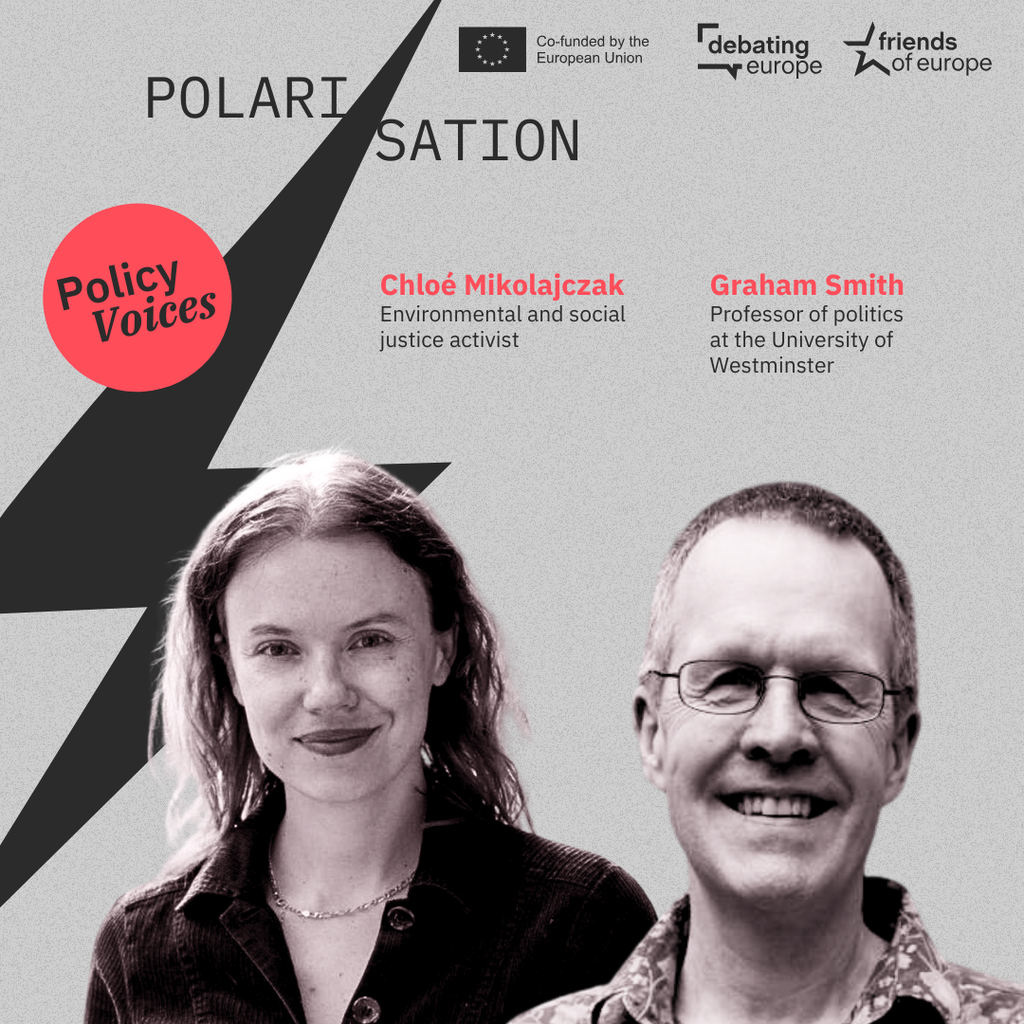Climate and Energy Summit 2025
Next event In person & livestreamed

- Area of Expertise
- Climate, Energy & Natural Resources

Member of the European Parliament and rapporteur on women, gender equality and climate justice
Linnea Engström is an MEP for Sweden’s Green Party and Vice-Chair of the EP Committee on Fisheries
Climate change is the single most pressing global injustice facing present and future generations, and one of the greatest human rights challenges of our time.
But climate change is not gender neutral. Women are disproportionately affected by climate change, but only a small part of climate funding is allocated specifically to the needs of women in the most affected countries.
And while there is a gender gap on climate funding, there is also a gender gap when it comes to the increasing problem of climate change denial.
Recently-published research shows that climate change denial is strongly correlated with accepting patriarchal or hierarchical structures. One extremely visible example of this is the new President of the United States, Donald Trump. He has attacked women’s reproductive rights and produced a litany of sexist remarks; he has also referred to climate change as a “hoax” and promised to withdraw the US from the 2015 Paris climate change agreement.
Climate denial is also on the rise in Europe, linked to an old faith in oil and coal as job-creating money machines, and to nationalism. Climate change is an inconvenient truth for nationalism: it is a problem that cannot be solved at a national level; it requires collective action between states and between all actors in society at all levels. And perhaps more provocatively, it calls for gender equality and the renouncement of a western masculine identity with its links to consumption patterns.
Climate change is an inconvenient truth for nationalism: it is a problem that cannot be solved at a national level
Lifestyles with a larger carbon dioxide footprint are linked to a high income, while lower incomes are linked to lower energy consumption. The traditional distribution of money and power, with men in possession of greater wealth and freedom of movement, therefore results in men being responsible for higher levels of greenhouse gas emissions. While rich women in the western world are responsible for higher CO2 emissions than poor men in developing countries, they are still likely to have a lifestyle that emits less CO2 than men with the same income do.
Research shows that polluting habits attributed to men are the result of the norms and values which define traditional masculinity and femininity. These images are very strongly embedded in our minds, reinforced by advertising aimed at increasing consumption. A car, for example, is sold as symbol of a man’s wealth and social status; we are told that ‘real’ men eat meat. Hegemonic masculinity explains why some forms of masculinity become dominant and others subordinate, and why certain traits come to define a ‘real man’. These traits change over time and vary between cultures, but are usually associated with power, strength, domination and aggression.
Breaking with traditional norms of consumption can therefore encourage a more gender-equal society and combat climate change, with both genders encouraged to use public transport and adopt a vegetarian diet. While this presents no problem for many progressive men, others – including many on the conservative right – have their identities increasingly tied up with notions of traditional masculinity. This makes green policies even more provocative: they challenge a gendered identity.
Considerations of gender are also necessary as we work to limit the negative impact of climate change upon the world’s population. Globally, women are more vulnerable to the effects of climate change than men, primarily because women constitute two-thirds of the world’s poor and because their livelihoods are more dependent on the natural resources that are threatened by climate change.
In 2015 the World Bank published a report showing that climate change in poorer regions such as sub-Saharan Africa and South Asia could force more than 100 million people into extreme poverty by 2030. Without a fair distribution of resources we face a world with millions of climate refugees: the United Nations estimates that there will be 200 million climate refugees by 2050. But with a rapid, inclusive and gender-sensitive development agenda focused on adapting to changing climate conditions, most of these impacts can still be prevented.
Globally, women’s livelihoods are more dependent on the natural resources that are threatened by climate change
Raising awareness of climate justice, the need for gender mainstreaming and the consequences of climate change is a prerequisite to tackling the challenges we face. The balance between adaptation and mitigation is unjust, and those who need the most frequently receive the least. Climate funding has become ‘big business’, and the most affected and most vulnerable are not part of the deal. The Paris agreement offers, for the first time, a chance for climate policymakers to focus on human rights and gender equality. This is crucial to ensure that climate mitigation and adaptation policies do not endanger the full enjoyment of human rights.
Women and men living in rural areas within developing countries are especially vulnerable. They face great challenges in securing water, food and fuel for cooking and heating. For women this issue is frequently coupled with limited mobility and unequal access to both resources and decision-making processes. In short, women often face social, economic and political barriers that limit their coping capacity. It is vital to identify gender-sensitive strategies to respond to the environmental and humanitarian crises caused by climate change.
Integrating gender into climate policy is efficient policymaking and a necessary tool to achieve climate justice on a global level. By introducing gender aspects into climate measures, policymakers will have to consider how different social factors, such as gender, education, income and age, determine our access to resources and our opportunities to act in a climate-friendly way.
The result of a gender-sensitive approach is that the diversity of social groups is more likely to be taken into account when formulating climate policies. That is why gender analysis is the starting point in making climate policy socially fair – and why climate change is certainly a feminist issue.
Commentary by Céline Charveriat, Executive Director of the Institute for European Environmental Policy (IEEP)
Linnéa Engström is right to say that intra-household dynamics and gender roles have a major influence on climate change outcomes, both in terms of the unequal distribution of the impacts and the ability to deploy low-carbon solutions at scale.
Despite the heroic efforts of the pioneering Mary Robinson Foundation for Climate Justice there is still little awareness and discussion among climate policymakers about gender. The debate is completely absent in Europe, as if gender dynamics exist only in the developing world. But nothing could be further from the truth.
Female participation and leadership in key climate change fields – energy, finance and infrastructure – lags in both the private and public sectors. In Europe in 2011, women held only 18.2% of high-level positions in ministries dealing with environment, climate change, transport and energy policies. A World Economic Forum study of 371 companies found that none of the energy companies had a female CEO. Agriculture and food, key sectors for climate change mitigation and adaptation, also show power imbalances: in 2007, only 29% of European Union farm owners were women.
But despite these statistics we should not pitch men (as perpetrators) against women (as victims). The dynamics are far more complicated.
In most developed countries women hold the key to a more sustainable, low-carbon food consumption patterns: they still make the vast majority of household purchasing decisions and generally prepare meals. Most workers in high-carbon sectors are men – 96% of American coal workers, for instance – and they will be most affected when climate change policies lead to job cuts in this sector.
Adopting a gender-sensitive approach to climate policy could help to identify new paths to an effective transition to a low-carbon economy and to the realisation of the United Nations Sustainable Development Goals. To start, we should increase efforts to gather sex-disaggregated data and mainstream gender into European climate and energy policies.
Finally, we must ask ourselves what other social issues are relevant to this debate. Is climate change only a feminist issue? I would argue that ‘generational justice’ is just as important. After all, people born after 2000 (and their future children) will bear the impact of climate change. To fight climate change effectively we must empower all young people, girls and boys, to speak out, act and innovate.
Next event In person & livestreamed

Past event In person & livestreamed

Past event In person & livestreamed

Past event In person & Livestreamed





Stay informed
We use cookies and similar technologies to adjust your preferences, analyze traffic and measure the effectiveness of our campaigns. Learn more about our privacy policy.